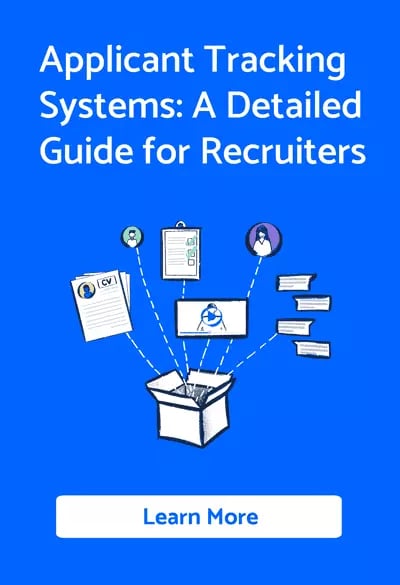A well-conducted interview is like a window into a candidate's professional sphere as you learn about attributes such as their skills, experience, academic qualifications, and team management.
Importance of interview scheduling in recruitment
Giving a glimpse of who the applicants are and what they can offer, the interview schedule is a process to look into what exactly fits the job role.
Undoubtedly the interview process takes lots of time and effort. Automating it with hiring management software like an applicant tracking system can make the interview scheduling process more efficient and productive.
In this how to improve the interview process article, we have summarised the best ways to do this.
Analysing your current interview scheduling process
Job recruitment is the primary goal of hiring professionals. The foremost step in onboarding the top talent is learning about the current interview scheduling method. Track all steps involved in the interview process below:
- Review the job description to ensure the candidate’s portfolio matches the job requirement and aligns with the company's needs.
- Determine the steps involved in the interview process, like resume screening, communication with candidates, shortlisting for the interview round, and interview questions to be asked of the applicants.
- Identify the key performance indicators to acknowledge the percentage of selected candidates, time of hire, cost of hire, and retention rate.
- Check out the method or process of how the data of candidates is collected.
- Determine the process of analysing candidates’ data and identifying the drop-off areas.
1. Identifying bottlenecks and pain points
Hiring is a never-ending process. When you align with the priorities of business goals, you will come up with the zones or departments where the bottleneck competition is higher than the others.
Go through the interview process followed in the past and look for the pain points in hiring:
- Which job role is the most demanding at present, and what are the challenges to closing this position?
- Look for the process which takes the most time in hiring.
- Which areas have a high rate of candidate drop-off in the recruitment process?
2. Gathering feedback from candidates and interviewers
Knowing about candidates' interview experience can make you aware of the areas of success, failure, and improvement in the hiring process. Being an interviewer, you should follow this practice to analyse the feedback for strategising future hiring needs by finding out answers to questions such as:
- Did the interviewer give you enough time to answer your question?
- How do you rate this interview process: tough, simple, or neutral?
- Did you feel comfortable answering the questions?
- Do you have suggestions regarding the interview improvement process?
- Were the questions asked relevant to the job description posted on the job boards?
Best practices for interview scheduling
You can strategise the recruitment plan with the best practices of scheduling interviews for candidates. Get an insight into ways to optimise your interview scheduling process:
1. Coordinate and connect immediately
After the screening round, you have the list of candidates in your hands. Be ready to connect with the top talent via phone, sms, or email. Communicate with them for a telephone interview round to understand what is expected and compile a template for scheduling interviews and the assessment process.
2. Prepare interview questions
When you know about a candidate's key role in a particular job position, you’re already halfway to achieving your hiring goals.
So, it’s important to develop a structured interview process by getting a list of questions to be asked in the interview rounds. Schedule interview questions based on job roles and analyse the feedback on similar data points. It will help reduce biases and give standard parameters to analyse the performance of candidates.
If you are hiring for a technical person, research the technical questions and confirm with the technical head or expert to determine the key skills required in the job role.
3. Speed up the hiring process with interview scheduling software
Optimise your recruitment with automation and streamline administrative tasks to reduce hiring time. Get the best interview scheduling software to strategise the recruitment process for coordination with candidates. Find an available time using the tool's calendar integration to conduct interviews and track the daily progress of your recruitment with a few clicks.
4. Track your recruitment KPIs
As the company plans the growth process, the headcount also demands an increase in the number of employees and their key roles. At that time, hiring managers should build a database using a talent pool, interview notes, enhancements, and suggestions based on a detailed analysis of recruitment KPIs.
This source of information helps you discover vast opportunities to reduce the time to hire and cost of hiring.
5. Strategise the interview process
You can opt for an applicant tracking system to review the previous and upcoming interview experiences. You can strategise the recruitment process by tracking the overall interview process and targets achieved in the past for future hiring needs. Get an insight into recruitment KPIs such as:
- Number of interviews scheduled successfully on different job boards in UK.
- Success rates of candidate screens vs the amount of time spent performing them.
- The time involved in scheduling the interviews by measuring time taken arranging them via phone calls, email or any hiring software that you're using that will replace these the need for these.
💡 Related Read:
Tips to promote a positive candidate experience during the interview scheduling process
When you bring give a positive gesture to candidates, they feel confident and relaxed to answer interview questions. Here are some top tips to facilitate the best experience during the interview process:
- Be responsive to answer the candidate’s acknowledgement via email, message, phone or your hiring platform. It implies that you respect their efforts to give in-person or video interviews.
- Have a clear conversation about the job requirement, expectations, and role to be played in the job position.
- Be flexible to offer a range of dates and times that can work for candidates and interviewers.
- Prepare the candidates beforehand about the interview format and types of questions to be asked.
- Give appreciation for their valuable time and efforts and thank them for sparing their time to come in for the interview.
- Be prompt in answering the results of interview rounds and close the loop by providing feedback.
Conclusion
The interview scheduling process is a crucial part of recruitment. With the help of digital technology and interview scheduling software, you can easily streamline your hiring process with automated reminders and notifications.
Ultimately, you can strategise a well-executed interview round to attract the top talent, create strong relationships with candidates and make data-driven decisions to save time and effort.






